In The Spirit Of Things occupies a strange place in the Kansas catalogue. At the time of its release in 1988, it was their second album without Kerry Livgren, their second album with Steve Morse & Billy Greer, their second after the return of Steve Walsh…it may not be far off to call it their second sophomore album. But it’s also an album of firsts. It’s their first album bringing in a big-name producer (Bob Ezrin), and despite their status as the greatest of the American progressive rock bands, Kansas tackle the creation of a concept album for the first (and only) time here. Oh, and it’s their first (but not last) album since Leftoverture to go nowhere commercially. But is it really a dud, or a diamond in the rough? Did we collectively miss something the first go-round?
Oh, we missed so much.
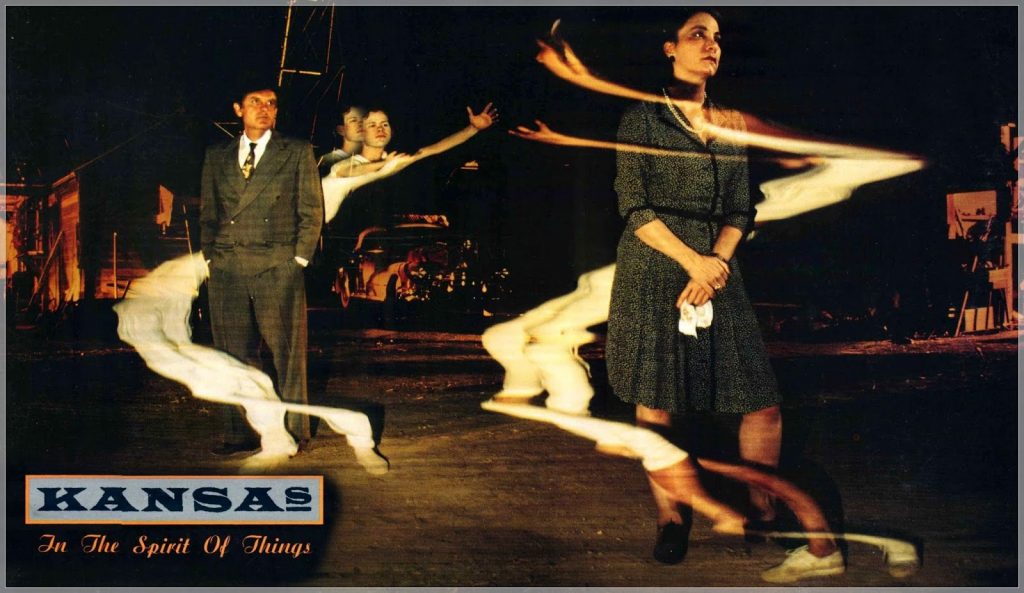
Background: Kansas decided to record a follow-up to the pretty well-received Power, and settled on a loose conceptual theme where each song on the album would be ‘about’ different individuals. Bob Ezrin—Mister The Wall/Welcome To My Nightmare himself—suggested they place all those individuals in the same place as a way of tightening up the concept. With a little help from a friend, the band members traveled to Neosho Falls, Kansas to see a real-life ghost town, and that became the setting for the album. In the Great Flood of 1951, the small town (population <3,000) was inundated with 12 feet of floodwaters, and everyone left. They didn’t all die, and the town wasn’t actually destroyed—everyone just left and never came back. When Kansas visited in 1988, there were still goods on the shelves of the mercantile store, a fire engine was still parked in the street, there was even chalk still on the ledges in the schoolhouse. The town was exactly as it had been the night before the floodwaters came, except that it was now devoid of human life. Pretty inspiring stuff if you’re looking to write a concept album, but In The Spirit Of Things came out with virtually no support from the record company, didn’t sell, and it would take Kansas seven years to release another studio album. And it’s not like this is some secretly revered fan-favourite, either. Like the town that inspired it, In The Spirit Of Things sits mostly forgotten and utterly abandoned.
And well-preserved.
For a long time, I was a fan of the idea of this album but rather stumped by the execution. Even as loose concept albums go, this one is difficult to patch together just from the songs themselves; indeed, only two songs deal directly with the fate of Neosho Falls. The other songs’ task, then, is to repopulate the concept with the very thing that makes a ghost town so compelling: the ghosts. Objects are all around and in themselves of no consequence. What haunts the fire engine parked in the street or the canned goods on the store shelf is the human life that alone gives a context within which these objects make sense. I’ve come to realize that this is the real concept, enshrined in the title In The Spirit Of Things. This isn’t a half-told disaster story; it’s a fleshed-out, proper tragedy, filled with the human characters and emotions that make the disaster intelligible as a disaster, and not just another natural event.
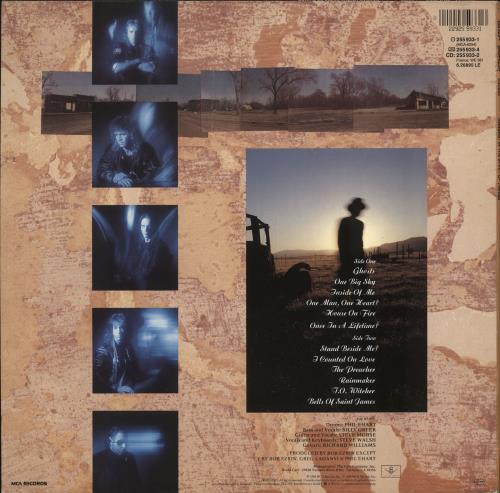
“Ghosts” declares from the start that this is going to be a radical departure for Kansas. Even on Power, fans were hearing a contemporaneous AOR version of the Kansas they already knew and loved, and there was precedent in songs like “Perfect Lover.” But this sparse spotlight on Steve Walsh, showcasing the more delicate nuances of his lower-range crooning? These accents of computer-programmed keys? It takes a full three minutes for Steve Morse’s guitar to build the bridge back to something recognizably Kansas. And that’s absolutely befitting the task at hand; a concept album is essentially a piece of musical theatre, and “Ghosts” is the prefatory ballad wherein the lead character/narrator strolls through the set, casually acquainting the audience with the general locale and emotional themes to come. You can practically hear the stage lights slowly coming on set piece by set piece, until the whole town of Neosho Falls has been bathed in dawn.
Cue “One Big Sky” as the big chorus number to introduce the cast of characters. Again, the sounds are suggestive of musical theatre tropes—I’m pretty sure those are the voices of people popping out of saloons and general stores to join the parade down Main Street. Is it kinda a big ball of 80’s schlock? Sure, but it continues the expansion of Kansas’ musical palette with programming for both keys and percussion and some really cool guitar call-and-response. Oh, and the join-hands chorus overshadows a rich lyricism that is part anti-war anthem, part reflection on how global events shape the life of a small town. “We are children of the future/Maybe we’re just passing through here/All depends on what you do here/Under one big sky.” The rest of the album pivots somewhat away from these plot elements to individual vignettes; the spirits in the things are the stories of what people have indeed done here under one big sky.
And with that, Bob Ezrin’s ‘tie-it-all-together’ concept recedes to the background in favour of the band’s original idea to showcase songs about different individuals. Quite apart from any concept, “Inside Of Me” is just a fantastic song, and quintessential Kansas at that. Ehart plays a restrained near-shuffle for the verses, Morse & Williams rip and roar as Kansas guitarists are wont to do, Greer adds volume down the middle, and the organ takes center stage. Violin might be the instrument most associated with Kansas, but the Hammond has always played a key role, and “Inside Of Me” features pomp & circumstance ala the proggiest moments on Masque. Further, what could have been a generic ‘me against the world’ anthem gets a life from some very specific, very cool imagery and Walsh’s perfect delivery: “So I skated in circles/Over cracks in the ice/And I stand in the shadows/Now my heart must pay the price.” As best as I can tell, this one has never been played live—a forgotten gem, indeed. As the current Kansas line-up makes a point of pulling out deep tracks from albums like Somewhere To Elsewhere, Freaks Of Nature, and Vinyl Confessions, hopefully “Inside Of Me” will finally see the limelight.
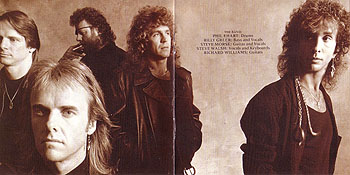
“One Man, One Heart” is the first (but far from the last) song with writing credits completely outside the band. The team of Spiro and Huff formed the writing core for Giant, whose debut would release a year after In The Spirit Of Things. Does it sound like they just passed an unneeded Giant song off on Kansas? Yes. But, after 20 seconds of pointless keyboard programming, a decent song emerges to introduce a frequent theme on the album—a small town on the brink of tragedy is gonna have a few disenchanted lovers on the brink of personal tragedy, of course. As the second verse kicks in, the track establishes itself as a great vehicle for Ehart’s thundering percussion, Morse gets in a few nice licks, and Walsh emotes on lyrics with some substance. If the subsequent mushy-middle of the album weren’t overloaded with ballads, “One Man, One Heart” would stand out as a gem of a deep cut.
On an album whose concept originally was “here’s a bunch of characters,” the firebrand lead of “House On Fire” shines as one of the most fully-realized personalities. Her counterpart is named Wheels, and Wheels damn-sure should have known better than to cross the titular burning house—“She is Justice—Justice is burning.” While the tragedy-prone relationships of the other songs shroud their struggles in ambiguities, the couple here flaunt the particularities of their grievances with fistfights and gunfire in the steets. A Hammond organ pervades the track, lending this song a more ‘classic’ Kansas feel than much of the rest of the band’s 80’s oeuvre, while some neo-Baroque guitar arpeggios pull things even further in the proggy direction of a “Musicatto.” But bracketing the prog/classic rock labels associated with this band, Kansas have always had more-than-a-little of a Southern boogie/Heartland honky-tonk thing sticking out of the pockets of their overalls, and “House On Fire” pushes that element of the classic Kansas sound to the fore. It was released as the b-side to the album’s only single; on the 1988-1989 tour, the song occupied the penultimate spot in the setlist, forming the core of an 11+ minute suite featuring an extended guitar-virtuoso intro, opening drum solo, and cover of Big Joe Williams’/Them’s “Baby, Please Don’t Go.” It was straight fire there, and it’s straight fire on the record, in penultimate position (almost) ending Side 1.
“Once In A Lifetime” swings for a big hit only to find out it’s not even in the right ballpark. The song should have been sung by Celine Dion; maybe in the context it would have made sense, and might even have been that big hit it can only masquerade as here. But as the third outside writing credit and the first of three straight ballads on In The Spirit Of Things? This would be the nadir of Kansas’ recording career, were it not for Always Never The Same ten years later. The finger-picked acoustic opening is pretty enough, then comes the requisite power-ballad electric shrieks, then…that chorus. That big, dumb chorus with all those unnecessary and unnecessarily loud sound effects. Rather than lifting the heart, the bombast here just flattens all emotion in a cookie-cutter cacophony. All that, and it never even released as a single.
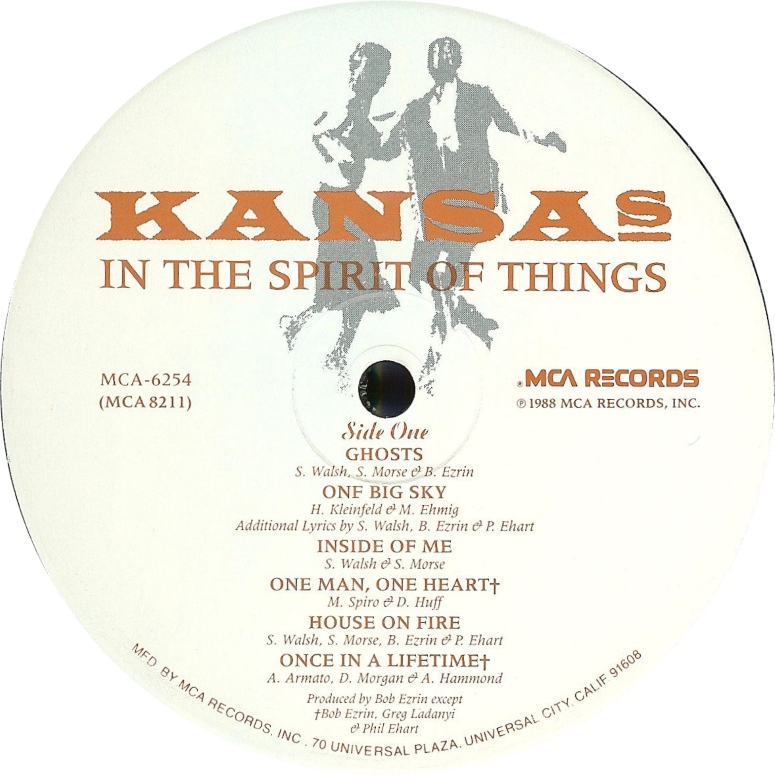
The distinction of being the album’s first—and only—single instead fell to “Stand Beside Me,” another outside writing credit and a decent enough slice of AOR calculation, despite the dubious quality of lyrics such as “I will come whenever you call/I will take it to the wall” and “Cruising this place/Like flesh on a neon sign.” However clumsy and hackneyed the sentiment, it’s carried well by bendy, synthy bass and the charm of Walsh’s voice at the height of its powers. He sounds so good that the band skips a guitar solo in favour of Walsh vamping on some impressively high notes, and it works. On November 5, 1988, “Stand Beside Me” peaked at #13 on the Billboard Mainstream Rock Chart—not that bad for a track far more mainstream than it is rock and lacking any hallmarks of the Kansas sound excepting Walsh’s still-golden throat.
“I Counted On Love” marks the third ballad in a row, a fault that the ritual of flipping a vinyl LP barely mitigates and that the relentless running order of a CD/streaming experience exacerbates. Really, this is the biggest hurdle to a deep appreciation of In The Spirit Of Things; the album has an interesting beginning, a strong ending, but a middle so soft it almost dares the listener to take a nap. Luckily, the writing team of Morse/Walsh returns with a belter that sounds like it could be an outtake from Power. Here, Ehart’s “big 80’s drum sound” is a welcome anchor for the gospel vocals, the synths play nice with Morse’s signature electric guitar tone, and though a lesser Kansas song, it at least sounds like a Kansas song. This is another track that begs for contemporary Kansas to dust it off for live performance, possibly in the opening acoustic sets they’ve been performing. Come to think of it, Celine Dion should really record this one, too. It’s an all-purpose Kansas song.
The woman in “House on Fire” is a dynamic personality, sure, but wait’ll you meet “The Preacher.” He is, apparently, obsessed with the Belt of Hercules and works it into all his sermons. Kansas are no strangers to mythological themes, of course, but what is this Greek myth doing in a concept album about the fall of a small Midwestern town? On the surface, this is just another vehicle for the heartland rock & gospel elements of the band’s sound, and the anthemic chorus supports this interpretation. But why this character, at this point in the album, and what does the Belt of Hercules have to do with the Bible and the devil and the Midwest? It’s all a bit obscure, but perhaps this track is the narrative link from “One Big Sky” through to the “Bells of Saint James.” Hercules fought a battle to secure the belt of Hippolyte (itself a gift to her from the god of war), and we know that the Korean War looms large in the background of Neosho Falls as it is presented on In The Spirit Of Things. Is this Preacher a symbol of the way in which religion and the military have fused in the American consciousness? “Put your dreams in your pocket boy” says The Preacher, and where exactly are we supposed to be following him to? Heaven, okay, but first to “Fight the battle for the belt of Hercules.”
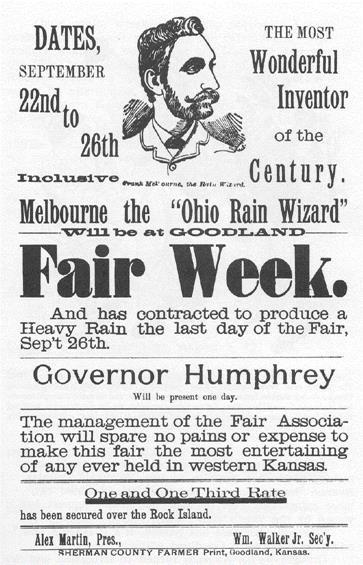
“Rainmaker” marks a return to the album’s explicit concern with the fate of Neosho Falls, as foreshadowed in the opening track. This is also a return to overt musical theatre, the song sung in the first person by the Rainmaker himself, complete with a theatre chorus to play off. The neo-Baroque interplay of organ and electric guitar returns as well for some amped-up prog rock cinematography—the band plays the sound of the storm that contributed to the Great Flood of 1951. The song manages to hit a number of musical and emotional highs as the story of Neosho Falls climaxes. The Rainmaker is a classic charlatan, a panhandling drifter type who rolls into small towns to take advantage of his countrymen before stealing away under cover of darkness, out as quickly as he came in. We know the type from countless “Old West” movies, but he had a real-life counterpart in the 19th century Midwest who inspired rainmaking efforts well into the 1970’s. But here, the classic character portrait is twisted as the narrator becomes just another poor soul in the wrong place at the wrong time. Surely his raindance didn’t really cause the Great Flood, did it? And yet, the coincidence is so great—mystical conduit or no, he can never escape the anguish, the sense of responsibility for his part in the destruction. Perhaps this song is the soundtrack to a morality play, as the former Rainmaker travels his old medicine man route to recount his very personal warning against hubris.
The instrumental “T.O. Witcher” is a unique track in the Kansas catalogue. Coming in at under two minutes and performed solo by Steve Morse, it’s less a Kansas song and more a bit of prettiness custom designed as a live prelude to drag out the intro to “Dust in the Wind” long enough for the other band members to finish their pee break. Still, it *is* pretty, and in the context of the album this brief acoustic foray serves as a respite between the emotional swells of “Rainmaker” and “Bells of Saint James.” Ephemeral, yes—like the lives and loves of the residents of Neosho Falls?
The album’s closing track, “Bells of Saint James,” would be the discerning progressive rock fan’s pick for best track—heck, it might be the only song from the album that occasionally gets some fond remembrance in those rare moments that In The Spirit Of Things gets mentioned at all. The steady, marching rhythm of the verses underscores the wartime context of this song. This is the (musically dramatic) monologue of an unlucky GI who receives a Dear John letter. Magnanimously, he declares “I don’t blame my enemies and I don’t blame my wife/For love fires that fleeted long ago” despite the fact that “It was someone else’s homeland/It was someone else’s war/But at the line of the 38th parallel/It was her I fought them for.” But the tragedy goes far deeper than just love lost (as if that wasn’t enough); with no home to look forward to, this soldier’s hopes turn to his hometown, represented by the titular bells of Saint James. Surely some sort of homecoming awaits him when the horrors of the Korean War finally end. Of course, we the listeners know this is a false hope—if the soldier returns home at all, he will return to a ghost town, a repository for nothing but broken dreams. Those bells are not ringing, for there is no one left to ring them.
Perhaps, like another famous Bob Ezrin production, the album’s concept should best be understood as a cyclical storyline. Get to the end of the album, then start back at Side 1; now, the unnamed soldier of “Bells Of Saint James” becomes the narrator of “Ghosts,” and the whole album becomes the story of this person returning home to discover the tragedy of Neosho Falls and remember the family and friends who are not there to celebrate his return. And perhaps this point of view explains why the individual vignette songs focus so much on shattered romances and the spectre of war. If these are the lips from which we the listener are invited into the story, this loose concept album suddenly appears much tighter. But it takes several careful listens to find one’s way into the cycle and sketch the shape of the circle. Once into the circle, a truth is revealed: Kansas are a vibrant musical force who’ve always offered more than gets expected from a classic rock ‘legacy’ act. Even a lesser Kansas work—and In The Spirit Of Things is an obviously and significantly flawed album—rewards deep and repeated engagement from its listeners.
So well written and reviewed.
A well written, spot on review.
We had a wonder filled theme and an idea of the story we wanted to tell (and it was indeed meant to be a piece of musical theater) but we simply didn’t have the time to write it all properly. Musicals can take years to create and we only had a few months in total. We managed to get it right in a few instances but didn’t have enough of the right material in the end to tell the story. We did our best to add material that at least related to it. But the pieces you picked as the real theater were the ones that actually worked within the context.
I’m glad we tried. I really loved my time in Atlanta working with the band and with Brendan O’Brien as well. It was a varied and inspiring collection of personalities and influences, all on the highest order. It’s also when Steve Morse and I formed a deep friendship and musical partnership that endures to this day.
I used to wonder whether we could have taken those theatrical songs and finished the work. It’s too late now, I think. So the untold stories will remain ghosts in our memories only. And that’s probably all right. Sometimes a great notion (thank you Ken) can lead one down a river too difficult to navigate.
Thanks for taking the time to do this. It’s a real pleasure to see it through your eyes.
Bob
…I absolutely love this album. Everytime I listen to it I am swept up into a grand story that plays out like a film in my mind. I have actually put those themes to paper as a sort of screen play. My story is different from the original in that it borrows the themes from varying characters and fuses them into just three main characters. It is a grand retelling of the iconic Rainmaker and his ugly past, his new found love, and ultimately his redemption. The story travels backwards from an opening ghost town scene which miraculously comes to life again, and thus the story grows from there to a cresendo and shocking ending. I would love to see this fleshed out as a stage show or film.
Tony, that sounds awesome! Make it happen. It’s a good time for “classic rock” acts going to Broadway…
Really cool to see the producer himself give kudos to this well-written, and thoughtful piece. Funnily enough, I interviewed Kansas drummer/manager Phil Ehart last week, and he mentioned this album as being one of his three favorites by the band (the other two being the more obvious choices, Leftoverture and Point of Know Return). He said that it was great a great experience to work with you, Bob, and mentioned Rainmaker as his favorite track.
/Anders Lundquist, Rock’n’Roll Magazine, Sweden
Bob, it’s so very cool that you read this and took some time to fill in a little more of that background for us. Thanks for your hand in producing this and all those other wonderful albums that get a lot more (deserved!) love in popular discourse.
What a great, thoughtful review, and — for a real treat — a comment by Bob Ezrin, himself. Through the lens of time and what became of Kansas in the years following this album and MCA’s abandonment of its “legacy” acts, I always wondered if a rocker along the lines of “Power” would have kept them from Morse’s departure, the club circuit hell that followed for the next 10-15 years, and along with it, the deterioration of Steve Walsh’s voice. Hell, the “Power” outtakes were another album already half done. Probably not.
That said, “In the Spirit of Things” was a favorite of mine since it’s release, and I did get to hear many of those songs played live at the Palladium in NYC in 1989. The songs you point out as the highlight certainly are no shame to the Kansas catalog, and even the ballads had their moments, thanks to the God-given talent of Walsh.
One thing I would take issue with is the author’s reference to “Somewhere to Elsewhere” as the “nadir” of Kansas songwriting. With the return of Livgren? Really?
TJ, oh, no! I do actually hold a more-critical/negative-than-most view of Somewhere to Elsewhere, but my comment in the review is directed to Always Never The Same, the orchestrated album from 1998. Like every Kansas album, there’s good stuff on there, but I think Steve’s vocals were in bad shape and the new songs don’t make much of a mark. I’ve said more here: https://progreport.com/ranking-kansas-without-kerry-livgren/
Thanks for this very thoughtful commentary on an album I have always loved along with the rest of the Kansas catalogue (this one more than several though). I felt alone in loving this at the time, though I knew it had a good amount of the band’s magic in it. In a challenging climate they still made a worthy Kansas album. Thanks again.
I saw Kansas perform “Inside of Me” at the Royal Oak Music theatre (Royal Oak Michigan).. It was one of the very best Kansas shows Ive ever seen.. Have seen many… Got to meet Steve and Rich that night… Won’t forget the freezing bitter cold night it was as about twenty of us huddled near the back door for about 90 minutes waiting for them to emerge… Lol
Fantastic article.. Great read! Thank you so much for doing such a deserved tribute to that piece of work… Spent a lot of time listening to that one.
Being a huge Kansas fan & when you have the legendary Bob Ezrin on board you know you are going to get a well produced album.Must admit the album sounds great with Bob’s over the top production. Is the album too glossy? From a personal perspective i find the album very catchy & excellent songs too. There is a huge “shine” on Steve Walsh’s voice, and when you have Steve Morse as a 2nd guitar player it gives the album a harder edge. Although the album i guess sold poorly i do consider it quite a good record. But if you look @ their catalog you will find it rarely gets a mention. Looking forward to their new album which sounds quite good “The Absence Of Presence”.